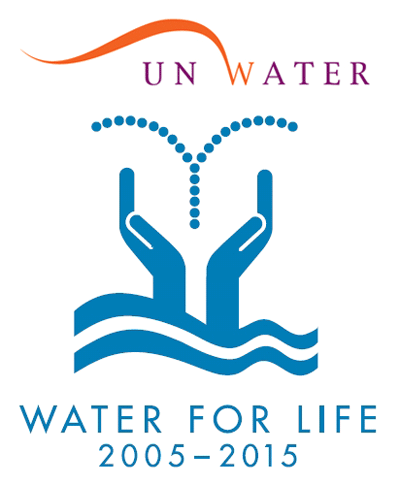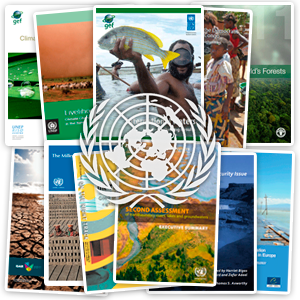- ON THE DECADE
- THE DECADE'S CAMPAIGN
- REPORTING ON PROGRESS
- THE DECADE'S PROGRAMMES
- FOCUS AREAS
-
- Access to sanitation
- Financing water
- Gender and water
- Human right to water
- Integrated Water Resources Management
- Transboundary waters
- Water and cities
- Water and energy
- Water and food security
- Water and sustainable development
- Water and the green economy
- Water cooperation
- Water quality
- Water scarcity
- FOCUS REGIONS
- RESOURCES FOR
- UN e-RESOURCES
News archives 2011
International Jury receives evaluation of best practices submitted to the 2nd edition of the 'Water for Life' UN-Water Best Practices Award
The 'Water for Life' UN-Water Best Practices Award recognizes outstanding best practices that can ensure the long-term sustainable management of water resources and contribute to the achievement of internationally agreed goals and targets.
The prize is awarded yearly in two categories. Every year, special emphasis is being put on the theme selected for next World Water Day. In 2012, special focus is given to the topic "Water for Food Security".
The Secretariat has received a total of 28 applications for its 2012 edition: 22 for category 1 'Best water management practices', 6 for category 2 'Best participatory, communication, awareness-raising and education practices'. Geographical distribution of applications is as follows: Africa 29%, Asia 32%, Europe 7%, Latin America and the Caribbean 32%.
A Technical Advisory Committee (TAC) formed by international experts of proven distinction in the water and communication sector from international organizations, initiatives, universities and Think Tanks, among others, have finished evaluating best practices received for the 2012 edition of the Award. Their evaluation has now being forwarded to an international Jury for final selection. Winners will be announced on 22 March 2012 on the occasion of World Water Day.
>> Composition of Technical Advisory Committee
>> Composition of Jury
>> 2012 edition by numbers
>> UN-Water "Water for Life" Best Practices Award website
Outcomes of the UN-Water International Conference 'Water in the Green Economy in Practice: Towards Rio 2012'. 3-5 October 2011. Zaragoza, Spain
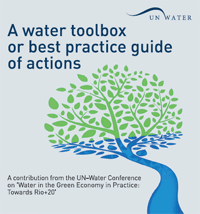 A conference book, which includes main outcomes of the conference, has now been issued and is available online. Chapter 1 introduces main challenges of the 2012 United Nations Conference on Sustainable Development and the water roadmap towards the Rio+20 conference. Chapter 2 introduces and discusses main challenges and opportunities for water in the transition to a green economy. Chapter 3 contains the papers prepared for the conference by the session conveners and case study representatives. Chapter 4 presents a summary of the presentations and discussions of the plenary sessions and side events of the conference. Chapter 5 introduces key water-related events on the roadmap towards Rio+20, main concerns about the future of the Millennium Development Goals, the role of UN-Water on the road to Rio and beyond and the UN-Water Statement for the Rio+20 Summit.
A conference book, which includes main outcomes of the conference, has now been issued and is available online. Chapter 1 introduces main challenges of the 2012 United Nations Conference on Sustainable Development and the water roadmap towards the Rio+20 conference. Chapter 2 introduces and discusses main challenges and opportunities for water in the transition to a green economy. Chapter 3 contains the papers prepared for the conference by the session conveners and case study representatives. Chapter 4 presents a summary of the presentations and discussions of the plenary sessions and side events of the conference. Chapter 5 introduces key water-related events on the roadmap towards Rio+20, main concerns about the future of the Millennium Development Goals, the role of UN-Water on the road to Rio and beyond and the UN-Water Statement for the Rio+20 Summit.
>> Oucomes from the UN-Water International Conference 'Water in the Green Economy in Practice'
Senegal: UN rights expert urges more spending on sanitation and clean water
 21 November 2011 - Ms. Catarina de Albuquerque, the Special Rapporteur on the human right to safe drinking water and sanitation, warned that millions of Senegalese remain "condemned to very unhealthy living conditions" until the West African country's Government significantly increases spending on ensuring major improvements to water and sanitation facilities.
21 November 2011 - Ms. Catarina de Albuquerque, the Special Rapporteur on the human right to safe drinking water and sanitation, warned that millions of Senegalese remain "condemned to very unhealthy living conditions" until the West African country's Government significantly increases spending on ensuring major improvements to water and sanitation facilities.
"The Senegalese Government has repeatedly stated that sanitation for all is a national priority. However, these promises have not been translated in sufficient budget allocations," said Catarina de Albuquerque, the Special Rapporteur on the human right to safe drinking water and sanitation, in a statement at the end of an eight-day visit.
"As resources are scarce, public investments in water and sanitation must prioritize those who need the most first," she added.
Noting that poor communities in Dakar, the capital, bore higher costs for access to clean water than richer households, Ms. de Albuquerque called the situation "unacceptable."
"Under no circumstances should those living in poverty have these fundamental rights denied because they cannot pay or because they cannot present the necessary documentation to benefit from these essential services," she argued.
Ms. de Albuquerque stressed, however that, better sanitation conditions would not be achieved by the construction of latrines and sanitary tanks alone. On top of those initiatives, she urged the promotion of improved hygiene practices to communities at large.
The Special Rapporteur pointed out that while Senegal's water network obtained coverage rates of 87 per cent in 2010, increased water access would have "little meaning" if the quality of the water offered was not adequate for consumption. She emphasized the need for the creation of a transparent regulatory agency to monitor the activity of Senegal's public-private waterworks, calling it a "crucial step" in ensuring the safety and accessibility of water and sanitation services.
According to last year's global annual assessment of sanitation and drinking by UN agencies, 95 per cent of countries reported that current funding was not enough to provide access to half of those without toilets.
Ms. De Albuquerque has been Special Rapporteur since September 2008 and works in an independent and unpaid capacity. She reports to the Human Rights Council in Geneva.
Former Ghanaian President to head UN-backed partnership on water and sanitation
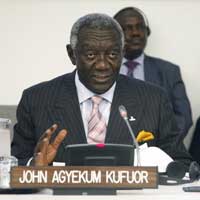 15 November 2011 - The former Ghanaian president John Agyekum Kufuor will head the United Nations-backed partnership known as Sanitation and Water for All, which works to achieve universal and sustainable access to decent sanitation and drinking water. "The dream of sanitation and water for every person is within reach, but it will take a great deal of political will, adequate resources, and coordinated efforts," said Mr. Kufuor, accepting his new position as the first high-level chair of the partnership.
15 November 2011 - The former Ghanaian president John Agyekum Kufuor will head the United Nations-backed partnership known as Sanitation and Water for All, which works to achieve universal and sustainable access to decent sanitation and drinking water. "The dream of sanitation and water for every person is within reach, but it will take a great deal of political will, adequate resources, and coordinated efforts," said Mr. Kufuor, accepting his new position as the first high-level chair of the partnership.
"I am committed to making this happen, because I am not content to live in a world where 2.6 billion people lack access to a decent toilet and 900 million people do not have clean water to drink," he said.
The partnership, which brings together governments, donors, civil society organizations, development partners and several UN agencies, works also with UN Water and the UN World Health Organization (WHO) to produce a global assessment report on drinking water.
The UN entities involved in the partnership are the UN Children's Fund (UNICEF), the UN Development Programme (UNDP), the UN Human Settlements Programme (UN-Habitat) and UN University (UNU).
Mr. Kufuor will chair the next high-level meeting of the partnership in April in Washington D.C., which will bring together finance and water ministers from developing countries to discuss the economic benefits of investing in sanitation and water.
>> Sanitation and Water for All website
Information materials on the human right to water and sanitation: Now available in Portuguese!
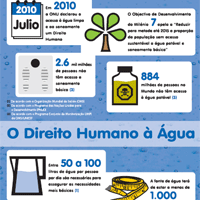 19 October 2011 - Thanks to the Joint Monitoring Programme for Water Supply and Sanitation in Angola, information materials on the human right to water and sanitation which were produced by the UN-Water Programme on Advocacy and Communication (UNW-DPAC) are now available in Portuguese.
19 October 2011 - Thanks to the Joint Monitoring Programme for Water Supply and Sanitation in Angola, information materials on the human right to water and sanitation which were produced by the UN-Water Programme on Advocacy and Communication (UNW-DPAC) are now available in Portuguese.
>> Reader [ – 101 KB]
– 101 KB]
>> Milestones [ – 110.7 KB]
– 110.7 KB]
>> Media brief [ – 176.6 KB]
– 176.6 KB]
>> Facts and Figures [ – 2.24 MB]
– 2.24 MB]
New resolution on the human right to safe drinking water and sanitation
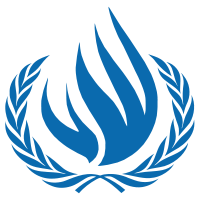 On 28 September 2011, the UN Human Rights Council passed a new resolution which takes the human right to safe drinking water and sanitation a step further. The Council welcomed the submission of the compilation of good practices on the right to safe drinking water and sanitation, in which the Special Rapporteur put particular emphasis on practical solutions with regard to the implementation of the human right to safe drinking water and sanitation. The resolution calls on States to ensure enough financing for sustainable delivery of water and sanitation services.
On 28 September 2011, the UN Human Rights Council passed a new resolution which takes the human right to safe drinking water and sanitation a step further. The Council welcomed the submission of the compilation of good practices on the right to safe drinking water and sanitation, in which the Special Rapporteur put particular emphasis on practical solutions with regard to the implementation of the human right to safe drinking water and sanitation. The resolution calls on States to ensure enough financing for sustainable delivery of water and sanitation services.
>> Access resolution A/HRC/RES/18/1
Bimonthly Publications Review: 6th issue is out!
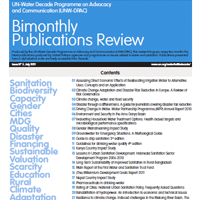 Produced by the UN-Water Decade Programme on Advocacy and Communication (UNW-DPAC), this review brings you every two months the latest publications produced by United Nations agencies and programmes on issues related to water and sanitation.
Produced by the UN-Water Decade Programme on Advocacy and Communication (UNW-DPAC), this review brings you every two months the latest publications produced by United Nations agencies and programmes on issues related to water and sanitation.
To subscribe please send an email to water-decade@un.org with the subject line 'Subscribe Bimonthly Publications Review'.
>> Access the 6th issue of Bimonthly Publications Review [ – 413.2 KB]
– 413.2 KB]
New report: The bioenergy and water nexus
 1 September 2011 - Bioenergy and water are inextricably linked. This report, building on the work of various new initiatives including UNEP's International Resource Panel, provides recommendations and outlines options in respect to bioenergy in support of a Green Economy. The report primarily addresses the following two questions: 1) how are the production and use of bioenergy products likely to influence the future state of water resources? 2) how can society mitigate impacts and guide development towards sustainable use of these resources, including groundwater, rivers, and riparian and wetland systems? In considering the ways in which bioenergy can impact water resources, the report identifies appropriate tools for assessing effects at different spatial and temporal scales. A number of indicators and assessment tools have been developed to include the water perspective in analyses and to assist strategy development and land use planning.
1 September 2011 - Bioenergy and water are inextricably linked. This report, building on the work of various new initiatives including UNEP's International Resource Panel, provides recommendations and outlines options in respect to bioenergy in support of a Green Economy. The report primarily addresses the following two questions: 1) how are the production and use of bioenergy products likely to influence the future state of water resources? 2) how can society mitigate impacts and guide development towards sustainable use of these resources, including groundwater, rivers, and riparian and wetland systems? In considering the ways in which bioenergy can impact water resources, the report identifies appropriate tools for assessing effects at different spatial and temporal scales. A number of indicators and assessment tools have been developed to include the water perspective in analyses and to assist strategy development and land use planning.
>> Access 'The bioenergy and water nexus' report [ – 4.36 MB]
– 4.36 MB]
World Water Week Message to Rio+20: The Stockholm Statement
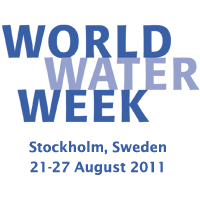 1 September 2011 – As a result of World Water Week, Stockholm, 21-27 August 2011, the Stockholm Statement recognizes that Rio+20 provides an opportunity for global leadership and underscores that the foundation for a green economy must be built upon water, energy and food security. The Stockholm Statement calls on the Rio+20 Summit to commit to achieve a series of targets concerning, among others, water efficiency in agriculture and energy or water pollution.
1 September 2011 – As a result of World Water Week, Stockholm, 21-27 August 2011, the Stockholm Statement recognizes that Rio+20 provides an opportunity for global leadership and underscores that the foundation for a green economy must be built upon water, energy and food security. The Stockholm Statement calls on the Rio+20 Summit to commit to achieve a series of targets concerning, among others, water efficiency in agriculture and energy or water pollution.
>> Stockholm Statement to Rio+20 [ – 288 KB]
– 288 KB]
New report: UN underlines importance of sustainable use of Iraqi Marshlands as water resource
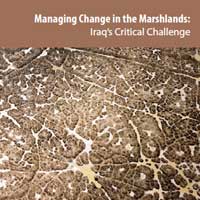 25 August 2011 – This report focuses on the importance of the Marshlands ecosystem services and the social, economic, and cultural benefits they provide to the Iraqi people. It shows the need to intensify the work being done for Marshlands revitalization and rehabilitation. This report is intended to provide guidance to the Iraqi Marshlands stakeholders as well as the international community, to help build consensus on the desired future for the Marshlands. The purpose of this paper is three-fold. Firstly, it aims to provide a comprehensive overview and analysis of the current situation in the Marshlands region, focusing on both ecosystem and human development analysis. The paper aims to identify specific gaps in the existing data and elaborate on the need for future actions, based on a range of possible development scenarios. Secondly, this paper intends to direct the attention of policy-makers towards governance and management issues in the Marshlands, with view of advocating development of a single national vision for the Marshlands. Finally, the paper will serve as a base reference for the key stakeholders in the Marshlands to launch a specific set of initiatives to re-address the governance, human development and environmental challenges in the Iraqi Marshlands.
25 August 2011 – This report focuses on the importance of the Marshlands ecosystem services and the social, economic, and cultural benefits they provide to the Iraqi people. It shows the need to intensify the work being done for Marshlands revitalization and rehabilitation. This report is intended to provide guidance to the Iraqi Marshlands stakeholders as well as the international community, to help build consensus on the desired future for the Marshlands. The purpose of this paper is three-fold. Firstly, it aims to provide a comprehensive overview and analysis of the current situation in the Marshlands region, focusing on both ecosystem and human development analysis. The paper aims to identify specific gaps in the existing data and elaborate on the need for future actions, based on a range of possible development scenarios. Secondly, this paper intends to direct the attention of policy-makers towards governance and management issues in the Marshlands, with view of advocating development of a single national vision for the Marshlands. Finally, the paper will serve as a base reference for the key stakeholders in the Marshlands to launch a specific set of initiatives to re-address the governance, human development and environmental challenges in the Iraqi Marshlands.
>> Access the 'Managing change in the Marshlands: Iraq's critical challenge' report
[ – 1.65 MB]
– 1.65 MB]
New synthesis report: Investing in ecosystem services can boost food security
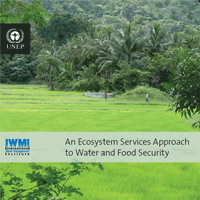 23 August 2011 – Investing in healthy ecosystems can boost food security, improve resilience to climate change and provide economic benefits for poor communities, says a new report by the United Nations Environment Programme (UNEP) and its partners. "An Ecosystems Approach to Water and Food Security," launched during World Water Week in Stockholm, Sweden, advocates managing and investing in the connections between ecosystems, water and food, through diversifying crops, planting trees on farmland and improving rainwater collection and other practical steps.
23 August 2011 – Investing in healthy ecosystems can boost food security, improve resilience to climate change and provide economic benefits for poor communities, says a new report by the United Nations Environment Programme (UNEP) and its partners. "An Ecosystems Approach to Water and Food Security," launched during World Water Week in Stockholm, Sweden, advocates managing and investing in the connections between ecosystems, water and food, through diversifying crops, planting trees on farmland and improving rainwater collection and other practical steps.
>> Access 'An ecosystem Services Approach to Water and Food Security' report
[ – 5.52 MB]
– 5.52 MB]
World Water Day 2012 logo just launched!
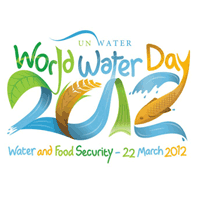 22 August 2011 – World Water Day is held annually on 22 March as a means of focusing attention on the importance of freshwater and advocating for the sustainable management of freshwater resources.
22 August 2011 – World Water Day is held annually on 22 March as a means of focusing attention on the importance of freshwater and advocating for the sustainable management of freshwater resources.
World Water Day (WWD) 2012 will focus on the issue of "Water for Food Security". The WWD logo for 2012 was launched at World Water Week 2011 in Stockholm, Sweden.
>> Visit the official Facebook page for World Water Day 2012
Caspian Sea States take further steps against oil pollution under UN-backed treaty
 15 August 2011 – The five countries bordering the Caspian Sea are to introduce an emergency response system to tackle oil pollution in the world's largest enclosed body of water as well as enhanced monitoring measures under new protocols to a United Nations backed treaty.
15 August 2011 – The five countries bordering the Caspian Sea are to introduce an emergency response system to tackle oil pollution in the world's largest enclosed body of water as well as enhanced monitoring measures under new protocols to a United Nations backed treaty.
High-level representatives from Azerbaijan, Iran, Kazakhstan, Russia and Turkmenistan agreed on the new steps in Aktau, Kazakhstan, at a meeting of the Conference of the Parties to the Tehran Convention, a legally binding agreement adopted in the Iranian capital in 2003.
Bimonthly Publications Review: 5th issue is out!
 28 July 2011 - Produced by the UN-Water Decade Programme on Advocacy and Communication (UNW-DPAC), this review brings you every two months the latest publications produced by United Nations agencies and programmes on issues related to water and sanitation.
28 July 2011 - Produced by the UN-Water Decade Programme on Advocacy and Communication (UNW-DPAC), this review brings you every two months the latest publications produced by United Nations agencies and programmes on issues related to water and sanitation.
To subscribe please send an email to water-decade@un.org with the subject line 'Subscribe Bimonthly Publications Review'.
>> Access the 5th issue of Bimonthly Publications Review [ - 517 KB]
- 517 KB]
Right to water and sanitation vital for achieving anti-poverty goals – UN officials
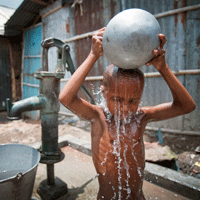 27 July 2011 - Top United Nations officials stressed the need to realize the human right to water and sanitation, stating that it is critical not only to a life of dignity but also to achieving progress in the areas such as poverty reduction, boosting child health and combating diseases. "We must reach all those who are denied the water and sanitation services that are necessary for their dignity and well-being," said Mr. Ban Ki-moon at the General Assembly Plenary Meeting on the Human Right to Water and Sanitation.
27 July 2011 - Top United Nations officials stressed the need to realize the human right to water and sanitation, stating that it is critical not only to a life of dignity but also to achieving progress in the areas such as poverty reduction, boosting child health and combating diseases. "We must reach all those who are denied the water and sanitation services that are necessary for their dignity and well-being," said Mr. Ban Ki-moon at the General Assembly Plenary Meeting on the Human Right to Water and Sanitation.
>> Full news article
>> Statement from Mr. Ban Ki-moon
Hailing drive to reinvent the toilet, UN expert warns technology is not enough
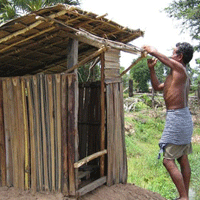 22 July 2011 - A United Nations human rights expert welcomed a multimillion dollar grant offered by the Bill and Melinda Gates Foundation aimed at "reinventing the toilet" to save water and transform human waste into energy and fertilizer, but warned it will take more than new technology to overcome the world's sanitation problems.
22 July 2011 - A United Nations human rights expert welcomed a multimillion dollar grant offered by the Bill and Melinda Gates Foundation aimed at "reinventing the toilet" to save water and transform human waste into energy and fertilizer, but warned it will take more than new technology to overcome the world's sanitation problems.
Catarina de Albuquerque, the UN Special Rapporteur on the right to water and sanitation, said: "New technology alone is not enough to overcome the sanitation and water crisis we face. Investments in software solutions, like awareness rising among the people on the vital importance of sanitation, are crucial to make sure the hardware solutions are actually used."
Independent UN expert urges Namibia to expand access to sanitation services
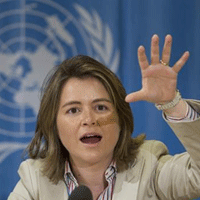 11 July 2011 - The United Nations independent expert on the right to water and sanitation took note of Namibia's success in expanding access to water and urged the Government to make similar efforts to ensure that proper sanitation is available to more people in the southern African country. At the end of a week-long visit to the country, Catarina de Albuquerque noted that Namibia has over the past 20 years achieved significant progress in extending its water network across the country.
11 July 2011 - The United Nations independent expert on the right to water and sanitation took note of Namibia's success in expanding access to water and urged the Government to make similar efforts to ensure that proper sanitation is available to more people in the southern African country. At the end of a week-long visit to the country, Catarina de Albuquerque noted that Namibia has over the past 20 years achieved significant progress in extending its water network across the country.
The United Nations launches major push to improve global sanitation by 2015
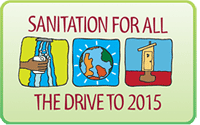 21 June 2011 - In a bid to improve the health and well-being of millions of people worldwide, the United Nations launched a major push to accelerate progress towards the goal of halving by 2015, the proportion of the population without access to basic sanitation.
21 June 2011 - In a bid to improve the health and well-being of millions of people worldwide, the United Nations launched a major push to accelerate progress towards the goal of halving by 2015, the proportion of the population without access to basic sanitation.
The drive, "Sustainable sanitation: The Five-Year-Drive to 2015", was established by the General Assembly in resolution 65/153, adopted in December 2010, that called on Member States to redouble efforts to close the sanitation gap, one of the eight Millennium Development Goals (MDGs) that world leaders have pledged to achieve by 2015.
>> Sanitation Drive to 2015 website
>> Full news article
UN forum delegates urge recognition of indigenous communities' right to water
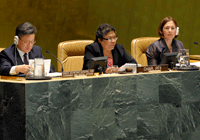 23 May 2011 – Indigenous communities are often not consulted when decisions are made on the use and management of water sources, despite the fact the access to the resource is vital for their cultural vitality and resilience, delegates attending the United Nation forum on indigenous issues said.
23 May 2011 – Indigenous communities are often not consulted when decisions are made on the use and management of water sources, despite the fact the access to the resource is vital for their cultural vitality and resilience, delegates attending the United Nation forum on indigenous issues said.
"Indigenous peoples are either sidelined or marginalized" when authorities legislate on water, which is considered a resource for economic gain, and the right of indigenous peoples to "original ownership" of water is ignored, said Valmaine Toki, a member of the UN Permanent Forum on Indigenous Issues from New Zealand.
Bertie Xavier, a member of the forum from Guyana, called for concerted efforts by States, organisations and UN agencies to draft a development strategy to protect the world's resources, particularly among indigenous communities.
UNSGAB member points out the urgent need to achieve the water and sanitation-related Millennium Development Goals
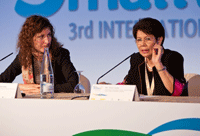 25 April 2011 - Ms. Olivia Castillo, member of the UN Secretary-General's Advisory Board on Water and Sanitation (UNSGAB), pointed out the urgent need to achieve the water and sanitation-related Millennium Development Goals and described the lack of a safe water supply and sanitation as a "silent crisis".
25 April 2011 - Ms. Olivia Castillo, member of the UN Secretary-General's Advisory Board on Water and Sanitation (UNSGAB), pointed out the urgent need to achieve the water and sanitation-related Millennium Development Goals and described the lack of a safe water supply and sanitation as a "silent crisis".
Ms. Castillo participated on 25th April 2011 in Seville, Spain, in the opening of the 3rd Smallwat International Congress, which analyzed water efficiency related questions, especially in rural communities. Ms. Castillo pointed out that the lack of access to safe water and sanitation continues to be the main cause of children mortality and an obstacle to development for several countries.
>> Speech from Ms. Olivia Castillo in the opening of the 3rd Smallwat International Congress [ - 97 KB]
- 97 KB]
UN rolls out innovative water carriers to help residents of arid Darfur region
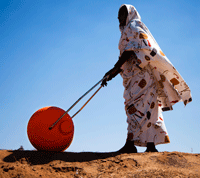 26 April 2011 - The residents of eight villages in Darfur will be among the first in the arid Sudanese region to have easier access to water under an initiative backed by the joint United Nations-African Union peacekeeping force. The mission will distribute several thousand high-capacity water containers – each shaped like a barrel, and capable of carrying 75 litres or four standard jerry cans of water - to the villages over the next two weeks.
26 April 2011 - The residents of eight villages in Darfur will be among the first in the arid Sudanese region to have easier access to water under an initiative backed by the joint United Nations-African Union peacekeeping force. The mission will distribute several thousand high-capacity water containers – each shaped like a barrel, and capable of carrying 75 litres or four standard jerry cans of water - to the villages over the next two weeks.
Women and children are usually responsible for collecting water for their families in Darfur, a vast region where rainfall is relatively low and droughts common. The containers are designed to relieve most of the physical burden of carrying water and to reduce the number of trips a resident will have to make to a water source.
Winners for the 2011 edition of the "Water for Life" Best Practices Award
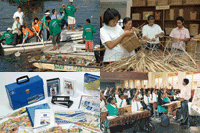 22 March 2011 - The United Nations Office to Support the International Decade for Action "Water for Life" 2005-2015/UN-Water Decade Programme on Advocacy and Communication (UNW-DPAC) and the UN World Water Assessment Programme (WWAP) organize the "Water for Life" Best Practices Award. The purpose of the Award is to promote efforts to fulfil international commitments made on water and water-related issues by 2015 through recognition of outstanding best practices that can ensure the long-term sustainable management of water resources and contribute to the achievement of internationally agreed goals and targets contained in the Millennium Development Goals (MDGs), Agenda 21 and the Johannesburg Plan of Implementation.
22 March 2011 - The United Nations Office to Support the International Decade for Action "Water for Life" 2005-2015/UN-Water Decade Programme on Advocacy and Communication (UNW-DPAC) and the UN World Water Assessment Programme (WWAP) organize the "Water for Life" Best Practices Award. The purpose of the Award is to promote efforts to fulfil international commitments made on water and water-related issues by 2015 through recognition of outstanding best practices that can ensure the long-term sustainable management of water resources and contribute to the achievement of internationally agreed goals and targets contained in the Millennium Development Goals (MDGs), Agenda 21 and the Johannesburg Plan of Implementation.
The prize is awarded yearly in two categories. Every year, special emphasis is being put on the theme selected for next World Water Day. In 2011, special focus is given to the topic "Urban Water Management".
The Secretariat has received a total of 74 applications for its 2011 edition: 39 for category 1 'Best water management practices', 35 for category 2 'Best participatory, communication, awareness-raising and education practices'. Geographical distribution of applications is as follows: Africa 15%, Asia 22%, Europe 24%, Latin America and the Caribbean 35%, Northern America 4%.
The 2011 Prize has been awarded to the following programmes:
- Category 1,Las Pinas-Zapote River System Rehabilitation Programme, Philippines
[ - 933 KB], for its outstanding contribution towards improving the living environment and its demonstrable and tangible impact on improving people's quality of life within a metropolitan river basin;
- 933 KB], for its outstanding contribution towards improving the living environment and its demonstrable and tangible impact on improving people's quality of life within a metropolitan river basin; - Category 2, A Participatory and Learning Based Approach to Raising Awareness on Water and Sanitation, Durban, eThekwini Municipality, South Africa [
 - 691 KB], for its innovative approach to communication and awareness raising in poor areas and its outstanding contribution to addressing key challenges related to water and sanitation in an urban area.
- 691 KB], for its innovative approach to communication and awareness raising in poor areas and its outstanding contribution to addressing key challenges related to water and sanitation in an urban area.
>>> Members of the Technical Advisory Committee and of the Jury [ - 557 KB]
- 557 KB]
>> Programmes/projects participating in 2011 edition [ - 110 KB]
- 110 KB]
>> 2011 edition of award by numbers [ - 85 KB]
- 85 KB]
>> Video on finalist candidates
March issue of bimonthly publications review now online
 30 March 2011 - Produced by the UN-Water Decade Programme on Advocacy and Communication (UNW-DPAC), this review brings you every two months the latest publications produced by United Nations agencies and programmes on issues related to water and sanitation. To subscribe please send an email to water-decade@un.org with the subject line 'Subscribe Bimonthly Publications Review'.
30 March 2011 - Produced by the UN-Water Decade Programme on Advocacy and Communication (UNW-DPAC), this review brings you every two months the latest publications produced by United Nations agencies and programmes on issues related to water and sanitation. To subscribe please send an email to water-decade@un.org with the subject line 'Subscribe Bimonthly Publications Review'.
>> Access the March 2011 issue of Bimonthly Publications Review [ - 548 KB]
- 548 KB]
UN-Water Activity Information System now online
 15 February 2011 - The UN-Water Activity Information System (UNWAIS), developed by the UN-Water Decade Programme on Capacity Development (UNW-DPC) is an online tool for managing, representing, analyzing and querying as well and disseminating information on existing water-related programmes, projects and activities carried out by UN-Water members, partners and associated programmes. Currently, the UNWAIS contains information on UN-Water members' and partners' activities regarding transboundary waters which were collected during a mapping exercise of the UN-Water Thematic Priority Area on Transboundary Waters in 2009-2010.
15 February 2011 - The UN-Water Activity Information System (UNWAIS), developed by the UN-Water Decade Programme on Capacity Development (UNW-DPC) is an online tool for managing, representing, analyzing and querying as well and disseminating information on existing water-related programmes, projects and activities carried out by UN-Water members, partners and associated programmes. Currently, the UNWAIS contains information on UN-Water members' and partners' activities regarding transboundary waters which were collected during a mapping exercise of the UN-Water Thematic Priority Area on Transboundary Waters in 2009-2010.
>> UN-Water Activity Information System (UNWAIS)
World Water Day 2011
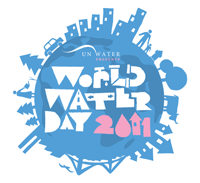 January 2011 - International World Water Day is held annually on 22 March as a means of focusing attention on the importance of freshwater and advocating for the sustainable management of freshwater resources.
January 2011 - International World Water Day is held annually on 22 March as a means of focusing attention on the importance of freshwater and advocating for the sustainable management of freshwater resources.
World Water Day 2011 focused on the issue "Water for Cities: Responding to the Urban Challenge". It focused international attention on the impact of rapid urban population growth, industrialization and uncertainties caused by climate change, conflicts and natural disasters on urban water systems. It also encouraged action by governments, organizations, communities, and individuals around the world to engage actively in addressing urban water management challenges.
The final report and photos of events organized in celebration of World Water Day 2011 are now available online.
>> Final report of World Water Day 2011
>> World Water Day 2011 website
>> Water for Life Voices campaign
>> Submit your voice!
>> Your #WaterForLifeVoices on Flickr
![]() Flickr
Flickr
![]() Slideshare
Slideshare
![]() Twitter
Twitter
![]() YouTube
YouTube

>> Outcome Document from OWG on Sustainable Development Goals
>> A Post-2015 Global Goal for Water: Synthesis of key findings and recommendations from UN-Water 
>> Post 2015 Water Thematic Consultation Report
>> Report of the High-Level Panel of Eminent Persons on the Post-2015 Development Agenda
>> UN-Water section on water in the post-2015 process
>> UN post-2015 agenda
>> DESA section on Post-2015
>> JMP Post-2015 global monitoring
>> Sustainable Development Goals e-Inventory
>> Summary of Stock taking meeting of Intergovernmental Negotiations on the Post-2015 Development Agenda
>> Synthesis Report of the Secretary-General on the Post-2015 Agenda
>> Decade's weekly
The Decade's weekly brings you every week the latest news from the Decade.
>> Bimonthly Publications Review 25, 26 and 27 [ - 546 Kb]
- 546 Kb]
UNW-DPAC. May 2015
>> Previous issues
Sustainable Development
15-17 January 2015: UN-Water International Zaragoza Conference ‘Water and Sustainable Development: From vision to action’
22 March 2015: World Water Day on Water and Sustainable Development
Biodiversity
2011-2020: UN Decade on Biodiversity
Deserts and Desertification
2010-2020: UN Decade for Deserts and the Fight Against Desertification
Energy
2014-2024: Decade on Sustainable Energy for All
22 March 2014: World Water Day on 'Water and Energy'
Sanitation
2011-2015: Sustainable sanitation: The Five-Year-Drive to 2015
19 November 2014: World Toilet Day
Copyright | Terms of use | Privacy notice | Site Index | Fraud alert | Help







